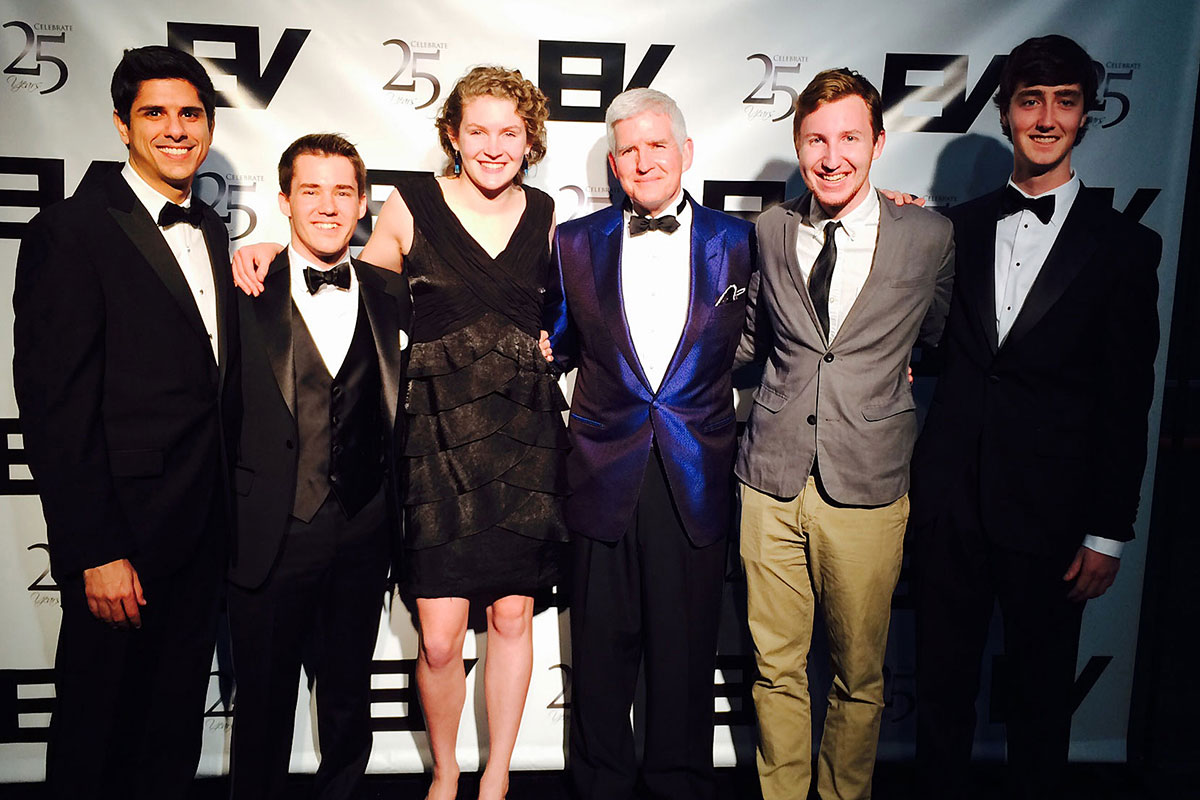• Host of U.Va. Grads Choose Service to Community and Country
Brendan Maupin Wynn, a fourth-year government major at the University of Virginia, holds a certain reverence for tradition. His grandfather, great-grandfather and great-great-grandfather all attended U.Va. and were members of the Jefferson Literary & Debating Society (as is Wynn). He says he “can’t possibly” step on the insignia in Poe Alley. And he counts Socrates Maupin – who entered the University as a student in 1828, ultimately became a chemistry professor and guided the school through the Civil War years while chairman of the faculty – as a cousin.
Wynn’s path to Grounds, however, was decidedly untraditional.
He moved out of his parents’ house while he was in high school. His father had had trouble coming to terms with Wynn’s sexuality.
“When I was 15, I told them I was gay and when I was 16, I was out of the house,” Wynn said.
His estrangement from his parents left him financially unmoored. He went to school from 7 a.m. to 6 p.m., attending a regular high school for most of the day and studying violin at the Governor’s School for the Arts in Norfolk during the afternoons. He spent his evenings working, trying to make enough money to pay rent.
When he graduated in 2008, he earned an academic merit scholarship and a music scholarship from his high school. This financial boost allowed him to attend Tidewater Community College for a semester. But in the absence of other forms of financial support, it wasn’t enough.
“I wasn’t able to apply for financial aid because I wasn’t being supported by my parents and they weren’t in communication with me to get the information I needed to fill out my FAFSA,” Wynn said.
A change to federal financial aid policy in 2009 offered the stroke of luck he needed. Wynn was able to request a “dependency override” on the FAFSA, the form that determines a student’s eligibility for federal student aid. With a dependency override in place, Wynn qualified for Pell grants – which were enough to send him back to community college.
He spent two years at Piedmont Virginia Community College. “At one point I worked four jobs to make sure I could pay for everything at the community college,” Wynn said. “It was only about six months, but it was something.”
He estimated that at his busiest he worked 60 to 70 hours a week outside of school, putting in time at restaurants and coffee shops, among other jobs. Again, structural rules governing how financial aid is dispensed had a tremendous effect on Wynn’s educational experience.
“The limitation with our community college system is they run a very tight ship,” Wynn said. “They’re able to provide federal grants and state grants where it exists, but that’s really it.”
Wynn’s hectic work schedule didn’t stop him from getting involved at PVCC. While earning an associate’s degree in liberal arts, he served as vice president of the school’s student government and served on a number of committees.
This drive to lead has served Wynn well at the University since he transferred here as a third-year student in fall 2012, administrators close to him said. At the University, Wynn has worked through a number of channels for causes that, for him, take on a personal cast: gay rights and student financial aid.
As the programs coordinator for the University’s LGBTQ Center, Wynn has helped develop and expand Safe Space training, which teaches students, faculty and staff how to better support lesbian, gay, bisexual, transgender and queer people.
“We’ve trained over 300 people this year in Safe Space,” said Scott Rheinheimer, the coordinator for LGBTQ student services. “The extension of Safe Space is one of his biggest legacies.”
Wynn’s interest in supporting students extends beyond LGBTQ issues. Among other activities, he’s advocated for AccessUVa through the University’s Committee on Financial Aid, served on the Memorial for Enslaved Laborers Committee, worked as a Transfer Student Peer Advisor and currently leads the University’s chapter of Virginia21, a student political advocacy organization.
“Brendan has a wonderful reservoir of energy in everything he does,” Dean of Students Allen Groves said. “He’s passionate about keeping U.Va. economically diverse, but he pursues this goal in a constructive and strategic manner that makes his advocacy much more effective. He also has a solid understanding of the economic challenges facing higher education in Virginia and has worked to engage political leaders in both parties to make funding a greater priority.”
Although Wynn has experienced firsthand the complexities and fickleness of financial aid, as well as the injury that anti-gay views can wreak on a family, he said that his personal history informs his advocacy only to a degree. “I think these are really basic issues,” he said. “My personal experiences inform these issues, but it can only inform them so much.”
Wynn hopes to continue to work for “basic fairness” in education – both higher education and K-12 education. He plans to pursue a master’s degree from the Frank Batten School of Leadership and Public Policy in 2015 (he has deferred his offer of admission). He also wants to earn a law degree – ideally from U.Va.’s School of Law, he said.
Wynn took a circuitous path to the University. But the whole time, he said, he “didn’t plan to go anywhere else but U.Va. It just wasn’t a reality with the particular circumstances I experienced in high school.”
Now, as Wynn prepares to graduate from a school his family members have attended almost since it was founded, life looks much different than it did when he was 16. And his dad, too, “has started to come around,” he said.
“I was stubborn enough to believe it would happen,” Wynn said. “I’m an optimist at heart.”
Media Contact
Article Information
May 6, 2014
/content/advocating-students-wynn-takes-inspiration-his-own-unusual-path

